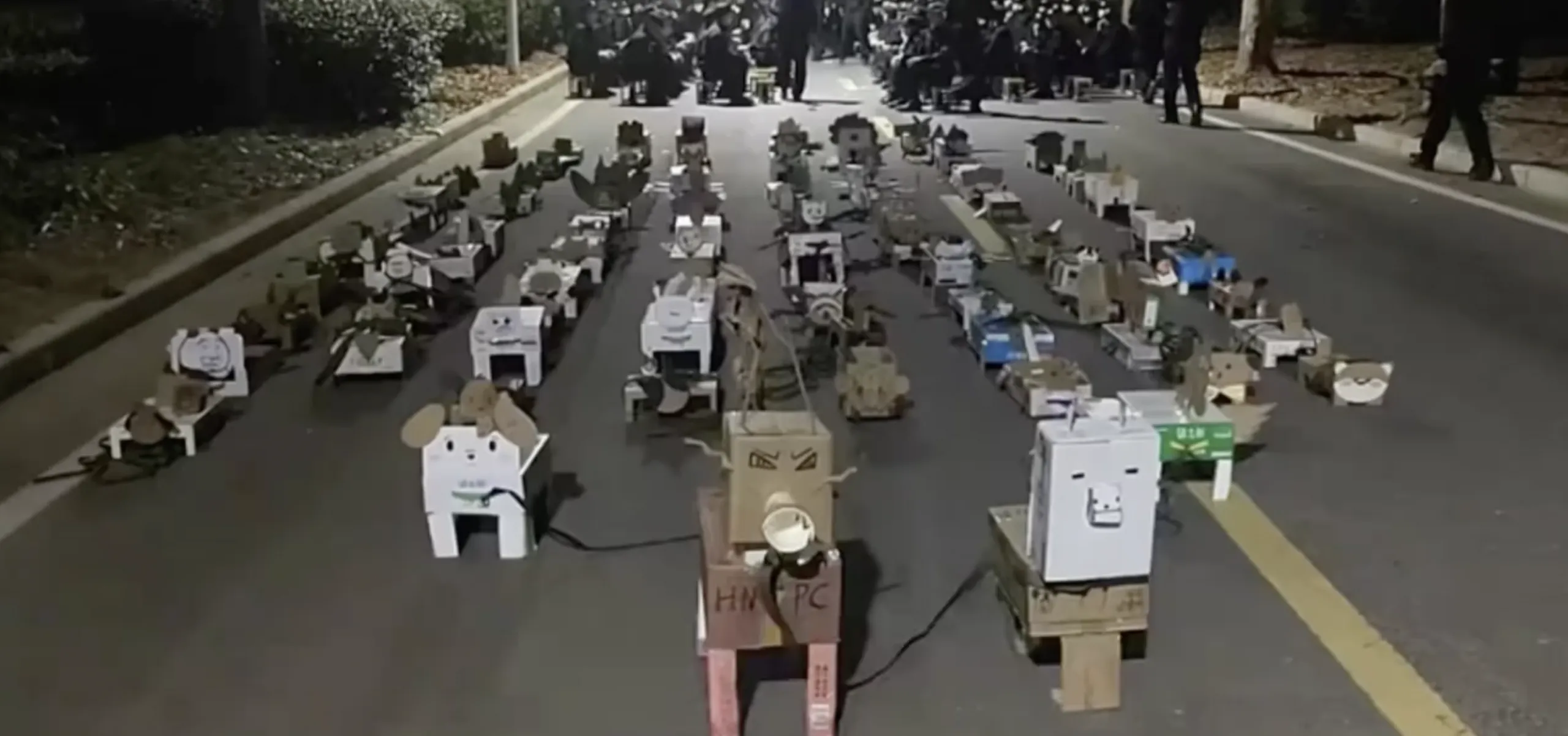Cardboard dogs, crawling, crazy talk: Discover the bizarre methods locked-down students use to ease anxiety
After weeks of growing anxiety amid slowly tightening Covid-19 restrictions in her university and with her midterm exams approaching, Liang Zhaohui (who wished to use a pseudonym for this piece) decided on a novel way to reduce her stress. One night earlier this month, Liang, a third-year finance major at the Univeristy of International Business and Economics (UIBE) in Beijing, gathered some friends in her dormitory and began crafting a canine companion out of cardboard boxes.
Over five hours, finishing at 4 a.m., Liang and her roommates followed instructions they found on social media platform Xiaohongshu to create a suave-looking Doberman pinscher in sunglasses who now sits loyally outside Liang’s room. “Before, you could say I was very depressed. My midterm exams were coming up, I had lots of deadlines, the Covid restrictions kept ramping up,” Liang tells TWOC. “We made a huge racket as we finished [the dog], and we all felt proud…Now every day I’m happy to see the dog at the door.”
Making cardboard pups has become a trend among stressed out students on Chinese university campuses. On social media platform Xiaohongshu, the hashtag “raising dogs in dorms” shows over 144,000 results at the time of writing, with students across the country showing off their crafting skills online. Some posts show whole corridors in dorm buildings with cardboard canines of various “breeds” sat outside every door, while videos show students taking their dogs outside for walks on campus, lining up for Covid tests with them, or even organizing sports competitions for them. Liang posted her own creation on the platform and received 6,000 likes.
With large events such as club activities and campus concerts mostly suspended or scaled back on campuses, and other activities and classes moved online, making the cardboard doggos is one way to socialize and stay creative amid the restrictions.
“In general, this is a novel way for college students to exercise their imagination to release stress, try to enrich their after-school life and increase social activities through a series of activities such as independent design and handicraft production,” Lu Lin, an academic at the Chinese Academy of Sciences and president of the Sixth Hospital of Peking University, told state media outlet Health Daily on November 4.
Crawling around
An even more eccentric craze is sweeping a number of campuses in China: crawling. Bored and anxious groups of students have been organizing group crawls where attendees get together, normally outside on campus, and roam around on all fours. Many videos of the phenomenon use the hashtag “modern college students’ mental state,” with over 6.5 billion videos on Douyin (China’s TikTok) featuring the term.
The fad apparently began at Beijing’s Communication University of China (CUC), before spreading to other campuses, and even apparently being banned in some schools.
On November 8, an anonymous post appeared on a CUC forum on WeChat asking if people would be scared if they saw someone crawling on the school grounds; if not, the author of the post would do it the next day. The post was a surprise hit, with many commenting below asking if they could join: “Can I join you? I feel like I’m mentally unstable lately,” one of the comments read.
A day later, a post on Xiaohongshu showed a dozen or so students crawling in a group on the soccer field on campus. The strange ritual attracted attention and amusement of other users, who suggested it looked like some sort of ancient rite, but the trend quickly spread to other universities ranging from Tsinghua University in Beijing to the Sichuan Fine Arts Institute in Chongqing. One “campus crawl” group for UIBE on WeChat has around 500 people in it, according to Liang.
Not everyone was thrilled by the strange new practice. According to The Paper, CUC administrators said the events were strictly student-organized and not endorsed by the university, while UIBE’s top administrator Huang Baoyin allegedly confronted a group of students engaged in the activity and ordered them to stop in the name of epidemic prevention.
Crazy talk
Cooped up campus, online platforms are one place where China’s students can still vent their emotions. Recently, some have taken to posting deliberately unhinged and nonsensical messages, perhaps as a means of relieving stress. This new method of writing has been dubbed “madness literature (发疯文学).”
“Who threw something down the drain! I just fell asleep! Why bother me, a sewer rat! Do rats have to be disturbed even when they are sleeping?” a documentary filmmaking major at CUC surnamed Wang wrote in her WeChat “Moments” social feed earlier this year, repeating the final sentence 14 times, after the campus was locked down due to a positive case. Wang, who only wished to give her surname, tells TWOC she has over 30 phrases and refrains of “madness literature” saved in her WeChat collections, which she frequently sends to friends or posts in her Moments feed.
Wang first received a piece of madness literature in the summer. Initially, the seemingly insane and often nonsensical text “was just interesting and fun,” she tells TWOC. “But later I discovered this writing somehow became a release for pressure in my life.” When she was stuck off campus for all of the spring semester earlier this year and her classes went online, the crazy writings paradoxically helped Wang stay sane.
The hashtag “madness literature” has over 690 million results on Douyin. Netizens have identified Lin Daiyu, a character in the classic Ming dynasty novel Dream of the Red Chamber, as the original “madness literature” speaker. In the novel, Lin is paranoid, sensitive, and suffers from an inferiority complex as she lives with the prestigious Jia family but is not considered one of them. For example, when Lin receives flowers in the book, and learns that she was not the only girl to get them, she sneers: “Hmph, I knew it! You only give me the leftovers picked for others!” Online, young netizens have taken to making memes using images on Lin from a TV adaptation of the novel and overlaying their own “madness literature” text.
For Wang, madness literature provides respite from her Covid-interrupted studies. Her classes on filming and video assignments should have meant traveling outside of campus to meet people and shoot, but instead they have turned into online classes for film editing and planning interview outlines. “I think my four years of college have been a complete waste. The epidemic and…online courses have eliminated many of the activities that students should be engaged in, like networking, traveling, and participating in extracurricular activities,” she tells TWOC.
In these circumstances, writing manically nonsensical phrases online, making cardboard dogs, or crawling on the ground are strangely effective means to stave off stress. As Liang has already learned, restrictions could be tightened at a moment’s notice. “Do the stuff you want to do immediately, [because] who knows if there is still time or opportunity tomorrow,” she says.
















